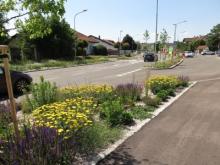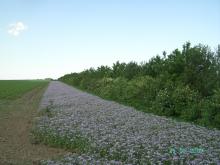

ARCADIA (EU Horizon Projekt)
Transformative climate resilience by natur-based solutions - short info
TrAnsformative climate ResilienCe by nAtur-baseD solutions in the contInentAl bio-geographical region is part of the Horizon Europe funding program for research and innovation (Project 101112737).
>> Short presentation on the Arcadia project
>> Link: ARCADIA Lab 1 - presented at the 31th Conference of the Danube Region
Background:
In 2021, the European Union published its strategy for adapting to climate change and launched the associated "Mission Adaptation to Climate Change" in 2022. The aim of the mission is to support and accompany 150 European regions on their path to climate resilience by 2030. Considering this background the Federal Government of Lower Austria – Department Environmental and Energy Economics (Amt der NÖ Landesregierung – Abteilung Umwelt- und Energiewirtschaft), the Agricultural District Authority (NÖ Agrarbezirksbehörde), Ecological Gardening (Natur im Garten GmbH), the Energy and Environment Agency of Lower Austria (NÖ Energie- und Umwelt GmbH), ecoplus. The Business Agency of Lower Austria ltd (NÖ Wirtschaftsagentur ecoplus GmbH) and Geosphere Austria have successfully applied for inclusion in the Horizon program and are now one of the 5 model regions of the ARCADIA project: Lower Austria (AT), Emilia Romagna (IT), Zagreb & Krapina-Zagorje (HR), Skåne (SE), Funen (DK), which will inspire fellow regions Plovdiv region (BG), Centru (RO) and Podravje (SI). A total of 43 partners are participating in the project under the overall lead of ART-ER Attrattività Ricerca Territorio Emilia Romagna.
Project content and activities in Lower Austria:
ARCADIA aims to develop nature-based solutions (NBS) for adaptation to climate change in several regions of Lower Austria for transfer to other European regions. With 260 municipalities in 28 climate change adaptation model regions (KLAR! program) and 3,000 hectares of soil protection systems & multifunctional hedges, Lower Austria has very good preconditions as a pioneering region.
In the scope of the project, Lower Austria will build 3 open co-innovation laboratories to design, test and foster adoption of the most promising solutions to climate resilience. The crucial points of the labs are:
A) Interconnected networks of green and blue infrastructures in urban and peri-urban areas
are delivering a range of ecosystem services, such as regulation and maintenance. Furthermore, they generate benefits to residents, including increased closeness to natural environment, opportunities for recreation and physical activity and support well-being and community identity.
B) NBS for agricultural landscapes, such as multi-use buffer strips and hedges or no/low tillage agricultural practices, protect arable land against erosion and soil degradation. NBS in this context make agricultural productivity, profitability and sustainability compatible.
C) NBS for climate-friendly site development and business area renewal
Climate change adaptation measures for site development and company relocations have enormous potential for achieving climate targets. Binding specifications for the climate-friendly design of business parks and company premises can be made via development plans or agreements under private law.
Duration:
54 months; January 1st 2024 – June 30th 2028.
Contacts in Lower Austria:
Abteilung Umwelt und Energiewirtschaft (Michael Hofstätter, Alexis Sancho-Reinoso, Karina Zimmermann)
GeoSphere Austria (Stefan Kienberger, Valentin Schalk, Johanna Wittholm)
NÖ Agrarbezirksbehörde (Erwin Szlezak, Christian Steiner, Katharina Deim)
NÖ Energie- und Umweltagentur GmbH (Tino Blondiau, Gabriel Olbrich, Caroline Goldsteiner, Sabine Plodek-Freimann) Natur im Garten GmbH (Christa Lackner, Lena Weitschacher, Felix Hagen)
ecoplus. Niederösterreichs Wirtschaftsagentur GmbH (Simone Hagenauer, Martin Schicklmüller, Peter Lechner)
04.11.2025
EUSDR PA10: 12th Danube Participation Day in Sarajevo
more ...30.10.2025
Online-Präsentation BBK-Projekt CNSoil - Zwischenergebnisse
more ...07.10.2025
CatchHedge - Potenziale von Hecken im Zeichen des Klimawandels
more ...16.+17.09.2025
32nd Conference of the Danube Region
more ...12.09.2025
Grundlagen der professionellen Bio-Mandel-Produktion
more ...10.09.2025
Agroforst u. Marktgärtnerei, Symbiose
more ...05.09.2025
Regionales Wiesensaatgut gewinnen mit dem Wiesensamenernter
more ...25.06.2025
Feldtag - StripTill im Bio-Mais im Trockengebiet
more ...25.06.2025
Seminar: Wildbienen- und Nützlingsförderung im Biolandbau
more ...24.06.2025
BOKU Green Plate Forum 3.0
more ...24.06.2025
Die Maulbeere - Kultur, Produktion u.Verwendung
more ...17.06.2025
Frühjahrstagung Österr. Gesellschaft für Agrar- und Umweltrecht (ÖGAUR)
more ...13.06.2025
Seminar: Artenvielfalt in Ackerbauregionen fördern
more ...03.06.2025
Seminar: Keine Angst vor der Ackerdistel
more ...03.06.2025
Agroforstsysteme: Anbau-Modelle der Zukunft
more ...20.05.2025
IDM-Generalversammlung 2025
more ...15.05.2025
Seminar: Unkräuter/Beikräuter erkennen und als Zeigerpflanzen nutzen
more ...13.+14.05.2025
Bodenforum Österreich - Frühjahrstreffen
more ...04.05.2025
Tageskurs: Perma-Veggies - Mehrjähriges Gemüse und essbare Stauden
more ...03.05.2025
Waldgärten-Exkursion
more ...





